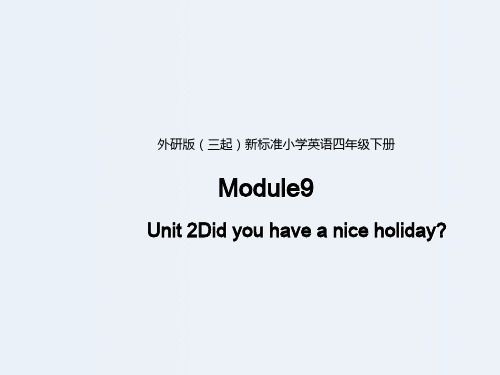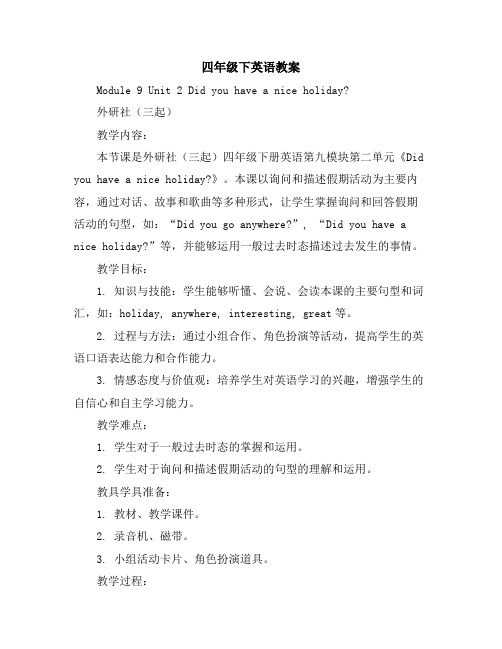四年级下册Module-9--Unit-2Did-you-have-a-nice-holiday
四年级英语下册Module 9 Unit 2 Did you have a nice holi外研版

B: Yes, I did. / No, I didn’t. I went there by… 是的。/ 不是,我乘……去的。
A: Did you have a nice holiday? 你度过了一个美好的假期吗 B: Yes, I did. / No, I didn’t. 是的/不是。
Module 9 Unit 2 Did you have a nice
holiday?
复习过去时态及动词的过去式
• 在英语中,当句子表示的是过去某个时候的状态 或者过去发生的事情时,要用一般过去时,那么, 它的动词就要用到过去式,动词的过去式,动词 过去式的构成有规则变化,也有不规则变化。
• 规则的过去式的构成方式之一:在动词后面 加— ed,
• 举例:play played ;如果动词是以不发音的e结 尾,就
• 直接加—d,举例:phone phoned; 不规则变化 的动词过去式也有很多,如:go went , sing sang , make made ;
Did you have a nice holiday? Yes, we did. We went to the earth.
Where is it? It’s West lake (西湖).
我们也来问问好朋友的旅行吧
A: Where did you go on your holiday? 你假期去了哪里旅行?henyang/ Dalian/ Xiamen… 我去了北京/杭州/沈阳/大连/厦门…
2019年四年级英语下册 Module 9 Unit 2 Did you have a nice holiday教案4 外研版

2019年四年级英语下册 Module 9 Unit 2 Did you have a nice holiday教案4 外研版教学目标:1、掌握单词:earth, Hong Kong, the Great Wall, West Lake2、掌握句型:询问对方过去是否做了某事:Did you +动词原形+过去的时间?对应的回答:Yes, I/we +did. No, I/we +didn’t.教学重点:询问对方过去是否做了某事:Did you +动词原形+过去的时间?对应的回答Yes, I/we +did. No, I/we +didn’t.教学难点:Did you +动词原形+过去的时间及对应的回答Yes, I/we +did. No, I/we +didn’t.教学准备:多媒体、图片、单词卡教学过程:Step 1: Warm up1、师生相互问候2、针对上节课询问他们过去是否做了某事的句型及与上节课相关的短语进行提问。
Step 2: PresentationT: Lingling had a nice holiday, now they are talking about it. L et’s have a look. So today we will learn Unit2 Did you have a nice holiday? Let’s begin!1、学习单词和句型让学生词不离句,在记住句子的同时记住单词(1)出示香港Hong Kong,并教授,同时提出问题Did you go to Hong Kong last year?通过领读,分组读的形式进行巩固练习,肯定回答Yes, I did.(2)教授West Lake,出示汉语,让学生试着说Did you visit the famous West Lake last year.及回答Yes, I did.(3)教授the Great Wall,给出英语Did you visit the Great Wa ll last week?让学生试着说出对应的汉语意思。
四年级下册英语Module9-Unit 2 Did you have a nice holiday?

Homewor kቤተ መጻሕፍቲ ባይዱ
Talk about “What did you do last holiday?” with your partner.
Module9
Unit 2 Did you have a nice holiday?
单词:earth 句子: Did you have a nice holiday? Yes,we did. We went to the earth. We went there by train. Did you visit the famous West Lake? Did you see your friend Lili in Hangzhou?
Guess and say.
教师准备表示地点的单词卡片。 学生两人一组,一名学生抽卡 片,另一名学生猜地点。 句型:Did you go st year? Yes, I did./No,I didn't. I went to....
Ask and answer.Then write.
Birdhouse
New
Language
Did
you
travel
by…plane
?
Yes, I did.
No, I didn't. I went there by…
plane bike
train ship
car bus
Questions
听录音,回答问题。
1.Did Xiaoyong have a nice holiday?
Did he…?
Yes, he did.
看图,说句子。
No, he didn’t.
New words earth 地球
外研版四年级英语下册Module9Unit2Didyouhaveaniceholiday教学课件

You made my day!
我们,还在路上……
Look at these photos.
Did you go to Hong Kong last year?
Yes , I did.
No , I didn’t.I went to…
Did you visit the Great Wall last year?
No, I did’nt. I went to Hangzhou.
Did you visit the famous West Lake ?
Yes , I did.
Did you see your friend Lili in Hangzhou?
• No, sheghai.
Did you travel by train?
Module 9
Unit 2 Did you have a nice
holiday?
Did you have a nice holiday?
Yes, we did. We went to the earth.
Did you like the people? Yes, I did. They were very nice. But they weren’t very beautiful!
Yes, I did. No, I did’nt. I went there by…
Homework
• 1. Read the text .
•不习惯读书进修的人,常会自满于现状,觉得再没有什么事情需要学习,于是他们不进则退。经验丰富的人读书用两只眼睛,一只眼睛看到纸面上的话,另 一眼睛看到纸的背面。2022年3月29日星期二2022/3/292022/3/292022/3/29 •书籍是屹立在时间的汪洋大海中的灯塔。2022年3月2022/3/292022/3/292022/3/293/29/2022 •正确的略读可使人用很少的时间接触大量的文献,并挑选出有意义的部分。2022/3/292022/3/29March 29, 2022 •书籍是屹立在时间的汪洋大海中的灯塔。
外研版四年级下册英语《Unit 2 Did you have a nice holiday?》教案

外研版四年级下册英语Module 9《Unit 2 Did you have a nice holiday?》教案一、教材分析:本课是外研版四年级下册Module 9《Unit 2 Did you have a nice holiday?》,主要围绕假期的话题展开。
通过本课的学习,学生将学习新词earth,掌握句型Did you...?,并能够阅读和理解课文大意。
二、教学目标:语言知识目标:1. 全体学生能够在所给的语境中理解本课的新词earth的含义。
2. 全体学生能理解并运用Did you...?这一句型。
3. 能够阅读和理解课文大意。
语言技能目标:1. 全体学生能认读earth生词。
2. 全体学生听懂并进行Did you...?的问答。
3. 大部分学生能通过阅读技巧,抓关键信息,读懂文本。
学习策略目标:1. 主动学习,初步感知和运用阅读方法。
2. 积极思考,并与他人交流合作,共同完成学习任务。
三、教学重难点教学重点:1. 学生掌握阅读方法,理解课文大意。
2. 在活动中渗透阅读技巧,提取Who,where,what,How,Why的关键信息。
教学难点:1. 掌握阅读技巧。
2. 培养学生的质疑能力,提升学生的思维品质。
四、学情分析:学生是四年级的学生,已经掌握了一定的英语基础知识,具备一定的听说读写能力。
他们对于新词和句型的学习具有一定的接受能力,但在阅读理解方面可能存在一定的困难。
因此,在教学过程中需要设计多样化的活动,引导学生主动思考和合作交流。
五、教学过程:Step 1: Warm-up1. Greet the students and ask them about their recent holidays. For example, "Good morning, class! How are you today?I hope you all had a great holiday. Now, can you raise your hand and share one fun thing you did during your holiday?"2. Show pictures of different holiday activities, such as swimming, hiking, or visiting a museum. Ask the students to discuss in pairs or small groups what they did during their holidays. Encourage them to use complete sentences to describe their activities.3. Have a class discussion and elicit responses from the students. Ask follow-up questions to encourage more detailedanswers, such as "Did anyone go swimming? Where did you go swimming? How was it?"Step 2: Presentation1. Introduce the new word "earth" by showing a picture or using real objects related to the earth, such as a globe or a map. Hold up the object and say, "This is the earth. Can you repeat after me? Earth."2. Elicit the meaning of "earth" from the students by asking questions like, "What do we call the planet we live on?" or "What is the name of our home planet?" Listen to their answers and provide a simple definition if needed, such as "The earth is the planet we live on."3. To practice the pronunciation of "earth" together as a class, lead a repetition exercise. Say the word clearly and have the students repeat it several times, emphasizing the correct pronunciation and intonation. Encourage them to pay attention to the vowel sound in the word.Teacher: "Now let's practice saying the word 'earth' together. Repeat after me: 'earth'."Students: "Earth."Step 3: Language Practice1. Introduce the sentence pattern "Did you...?" by askingthe students questions about their holidays using this structure. For example, "Did you go swimming? Did you visit any interesting places?" Model the correct responses and encourage the students to answer using the same sentence pattern.Teacher: "Now, let's talk about your holidays using the sentence pattern 'Did you...?' For example, I can ask, 'Did you go swimming?' and you can answer, 'Yes, I did. I went swimming at the beach.' Let's try it together."Student 1: "Did you go swimming?"Student 2: "Yes, I did. I went swimming at the pool."Teacher: "Great job! Now, let's continue with more questions and answers."2. Organize a pair or group activity where students take turns asking and answering questions about their holidays using "Did you...?" For example, one student can ask, "Did you go hiking?" and the other student can respond, "Yes, I did. I went hiking in the mountains."Teacher: "Now, I want you to work in pairs or small groups. Take turns asking and answering questions about your holidays using the sentence pattern 'Did you...?' Remember to use complete sentences. You can start with questions like 'Did you visit any interesting places?' or 'Did you try any newactivities?'"Students work in pairs or groups, asking and answering questions about their holidays using the sentence pattern "Did you...?" The teacher moves around the classroom, monitoring the students' conversations and providing assistance when needed.Teacher (providing guidance): "That's great! Now, try asking follow-up questions to get more information. For example, if your partner says they went hiking, you can ask 'Where did you go hiking?' or 'How was the hiking trail?'"Step 4: Reading Comprehension1. Divide the class into small groups and distribute copies of the reading passage to each group. The passage should be related to holidays or vacation experiences.2. Explain the purpose of the reading task and introduce the key questions: Who, where, what, how, why. Write these questions on the board.3. Instruct the students to read the passage silently and underline or circle the answers to the key questions. Encourage them to read carefully and pay attention to the details.4. After reading, encourage the students to discuss their answers within their groups and justify their choices. They can take turns sharing their answers and discussing any differencesor similarities.5. Conduct a class discussion to check the students' understanding and elicit their answers to the key questions. Ask different groups to share their answers and provide feedback on their comprehension.Step 5: Consolidation and Application1. Ask the students to work individually and write a short paragraph about their own holidays using the sentence pattern "Did you...?" For example, "Write a paragraph about your holiday activities. Start each sentence with 'Did you...?' and describe what you did during your holiday."2. Provide a writing template or guide to support the students in organizing their ideas. Include sentence starters like "Did you go to any interesting places? Did you try any new activities? Did you meet any new friends?"3. Encourage the students to share their paragraphs witha partner and give feedback on each other's writing. They can discuss what they liked about their partner's paragraph and offer suggestions for improvement.六、板书设计:Unit 2 Did you have a nice holiday?Did you...?Who? Where? What? How? Why?七、教学反思:本节课通过引导学生讨论假期活动、介绍新词并练习句型,以及进行阅读理解活动和写作练习,全面培养学生的听说读写能力。
2015春四年级英语下册-Module-9-Unit-2-Did-you-have-a-nice-holiday教学设计-外研版(三起)

Module 9 Unit 2 Did you have a nice holiday ?教学目标1.掌握本课的重点单词: holiday people earth2.掌握本课的重点句子:Did you have a nice holiday?3.能运用一般疑问句询问过去的行为。
【教学重难点】2.重点:单词holiday people earth these West Lake3.难点:一般过去时的一般疑问句结构Did you ...? 能运用一般疑问句询问过去的行为。
【教学过程】一、导入新课(一)导入新课,板书课题过渡语:Xiaoyong had a nice holiday.Let’s have a look,OK? Today we’ll learn Module 9 Unit 2 Did you have a nice holiday?(二)出示学习目标过渡语:At first Let’s see our learning aims. Read together.Boys and girls, are you clear? Please come on!二、先学环节(一)学生自学单词过渡语:Boys and girls, now let’s see what we will do this class.Let’s learn the new words by yourselves. OK?单词自学指导:(1)听单词录音,跟读。
第一次跟读一遍,第二次跟读三遍。
(2)小组内自学单词。
可以小组长领读,实行兵教兵,不会读的单词划出来,重点突破。
(3)各组提交不会读的单词,先找学生回答,学生不会的老师再帮助解决。
单词自学检测:过渡语:Boys and girls , have you finished? Hands up? Then I’ll check you.教师利用单词卡片,单个检查学生掌握单词的情况;运用PPT来检查新单词学生的掌握情况,学生根据PPT的图片,口头说出本节课学习的新单词。
四年级下册英语Module 9 Unit 2 Did you have a nice holi外研版

四、单项选择 1. We ____ to the earth last holiday.
A. went B. go C. will go 2. Look ____ these photos.
A. on B. / C. at 3. Did you ____ your friend?
A. take B. in C. by A C A A A C
Did you/he/she go to... Yes , I/ he/she did. No , I/ she/he didn't.
she I
Homework
1. Listen to the text 3 times . Then talk about Xiaoyong’s holiday with your parents.
Module 9
Unit 2 Did you have a nice holiday?
外星人来地球旅行了!让我们看看他们在论 谈什么?他们觉得地球怎么样?
Aliens(外星人) is coming.
We had a nice holiday. We went to the earth. The people were very nice. But they weren’t very beautful.
小小采访家 Did you go to…?
Did you travel by…?
选词填空
on by in to from
1.Welcome ____ Beijing. 2.My brother lives _____ New York. 3.I went to a pop concert ______ holiday. 4.This postcard is _____ my sister.
四年级下英语教案-Module9Unit2Didyouhaveaniceholidy-外研社(三起)

四年级下英语教案Module 9 Unit 2 Did you have a nice holiday?外研社(三起)教学内容:本节课是外研社(三起)四年级下册英语第九模块第二单元《Did you have a nice holiday?》。
本课以询问和描述假期活动为主要内容,通过对话、故事和歌曲等多种形式,让学生掌握询问和回答假期活动的句型,如:“Did you go anywhere?”, “Did you have a nice holiday?”等,并能够运用一般过去时态描述过去发生的事情。
教学目标:1. 知识与技能:学生能够听懂、会说、会读本课的主要句型和词汇,如:holiday, anywhere, interesting, great等。
2. 过程与方法:通过小组合作、角色扮演等活动,提高学生的英语口语表达能力和合作能力。
3. 情感态度与价值观:培养学生对英语学习的兴趣,增强学生的自信心和自主学习能力。
教学难点:1. 学生对于一般过去时态的掌握和运用。
2. 学生对于询问和描述假期活动的句型的理解和运用。
教具学具准备:1. 教材、教学课件。
2. 录音机、磁带。
3. 小组活动卡片、角色扮演道具。
教学过程:1. 导入:通过歌曲《Holiday Song》导入本课主题,激发学生的学习兴趣。
2. 新课呈现:通过课件展示本课的主要句型和词汇,引导学生跟读、模仿。
3. 小组合作:学生分组进行角色扮演,练习本课的对话。
4. 巩固练习:通过游戏、竞赛等形式,巩固本课所学内容。
板书设计:1. 本课的主要句型:Did you go anywhere? Did you have a nice holiday?2. 本课的主要词汇:holiday, anywhere, interesting, great 等。
作业设计:1. 听录音,跟读课文。
2. 抄写本课的主要句型和词汇。
3. 用一般过去时态写一篇关于自己假期的短文。
- 1、下载文档前请自行甄别文档内容的完整性,平台不提供额外的编辑、内容补充、找答案等附加服务。
- 2、"仅部分预览"的文档,不可在线预览部分如存在完整性等问题,可反馈申请退款(可完整预览的文档不适用该条件!)。
- 3、如文档侵犯您的权益,请联系客服反馈,我们会尽快为您处理(人工客服工作时间:9:00-18:30)。
Module 9 Unit 2
教学内容:Did you have a nice holiday?
教学目标:1.知识目标:掌握本单元的新单词earth,复习上一单元的单词。
巩固本模块的重点句型:Did…?以及相应的回答。
2.能力目标:能够在时间练习中熟练的运用本模块的新词
能运用本模块的知识对过去的动作提问,并能回答别人的提问。
3.情感目标:激发学生学习英语的兴趣,使学生养成勤于总结勤于
对比的习惯。
教学重点:1.掌握本单元的新词:earth ,复习上一单元的单词。
2.巩固Did…?句型及相应的回答。
教学难点:运用本模块的知识对过去的动作提问,并能回答别人的提问。
教学用具:课件,图片,点读笔,地球仪。
教学设计;一、Warmer.
1.师生之间进行自由对话。
使学生快速进入上课的状态。
T:Good morning/afternoon,everyone!
S:Good morning/afternoon,teacher!
T:I hope you have a nice day today!
S:Thanks!...
2.教师带领学生复习上一单元的单词及句型,进行造句练习。
二、Prersentation:
活动一:外星人对话:
1.教师展示地球仪,引导学生说出地球,然后教师将单词earth
板书到黑板上,进行教读。
教师在地球仪上指出New
York,Washington DC,San Francisco.的大概位置,并对这些城
市进行大概的介绍。
2.播放Listen point and say 部分的录音,学生跟读,教师对学
生的发音进行规范。
3.将学生分两组,分角色朗读对话。
4.将学生分为四人一组的小组,分别扮演课本中的四个机器
人,在课文内容的基础上,进行自由编对话活动。
设计理念与意图:用实物进行教学,加深学生对于单词的记忆,并丰富学生的语言知识。
活动二:听说练习
1.教师播放第二部分的录音,学生进行跟读,模仿录音的发音和
语气,教师对学生的发音进行规范。
及时对学生表现好的一面
进行表扬。
2.将学生分成三组,分角色朗读活动二部分的课文,比比哪组读
得好。
3.将学生分成四人一组的小组,分小组讨论上一次假期的生活,
说说自己都去了哪些地方,做了什么事情。
4.教师抽取部分学生进行对话练习。
设计理念与意图:及时对学生进行鼓励,争强学生的自信心,从而提高课堂效率。
三.趣味训练:
1、教师引导学生看point and say部分的图片,以及对话的例句展
示。
2、学生同桌之间进行对话练习,就图画的内容展开练习。
A:I went to Paris last year.
B:Did you travel by plane?
A:No,I didn’t. I went there by train.
A:I went to London last year.
B:Did you travel by plane?
A:Yes,I did.
3、教师出示更多的中国的城市照片,学生进行问答对话。
4、教师抽取学生进行对话展示。
设计理念与意图:利用课件出示多幅图片,让学生进行对话练习,巩固本课重点,提高语言运用能力。
四.Homework:
1.朗读活动二课文。
2.熟记本模块的新单词
板书设计:
Unit 2 Did you have a nice holiday?
earth 地球
conversation:
A:I went to Paris last year.
B:Did you travel by plane?
A:No,I didn’t. I went there by train,
A:I went to London last year.
B:Did you travel by plane?
A:Yes,I did.
教学反思:生动有趣,重在实践的教学方法有助于营造出一个人性化的教学环境,不仅有利于调动孩子的学习积极性,提高教学效果,还有利于孩子身心。
情感的健康发展。
在进行教学的同时,教师要善于走进学生的情感世界,把自己当做学生的朋友去感受学生的喜怒自乐。
“爱学生是最好的教育,爱学生是和尊重学生,信任学生连在一起的。
只有平等的爱才能达到心灵的深处”。
合格的教师应能够发现学生的闪光点,善意的点头,友好的微笑,微不足道的夸奖都有可能拯救或帮助一个学生,教师尽可能奉献自己的爱心,去感染学生。
